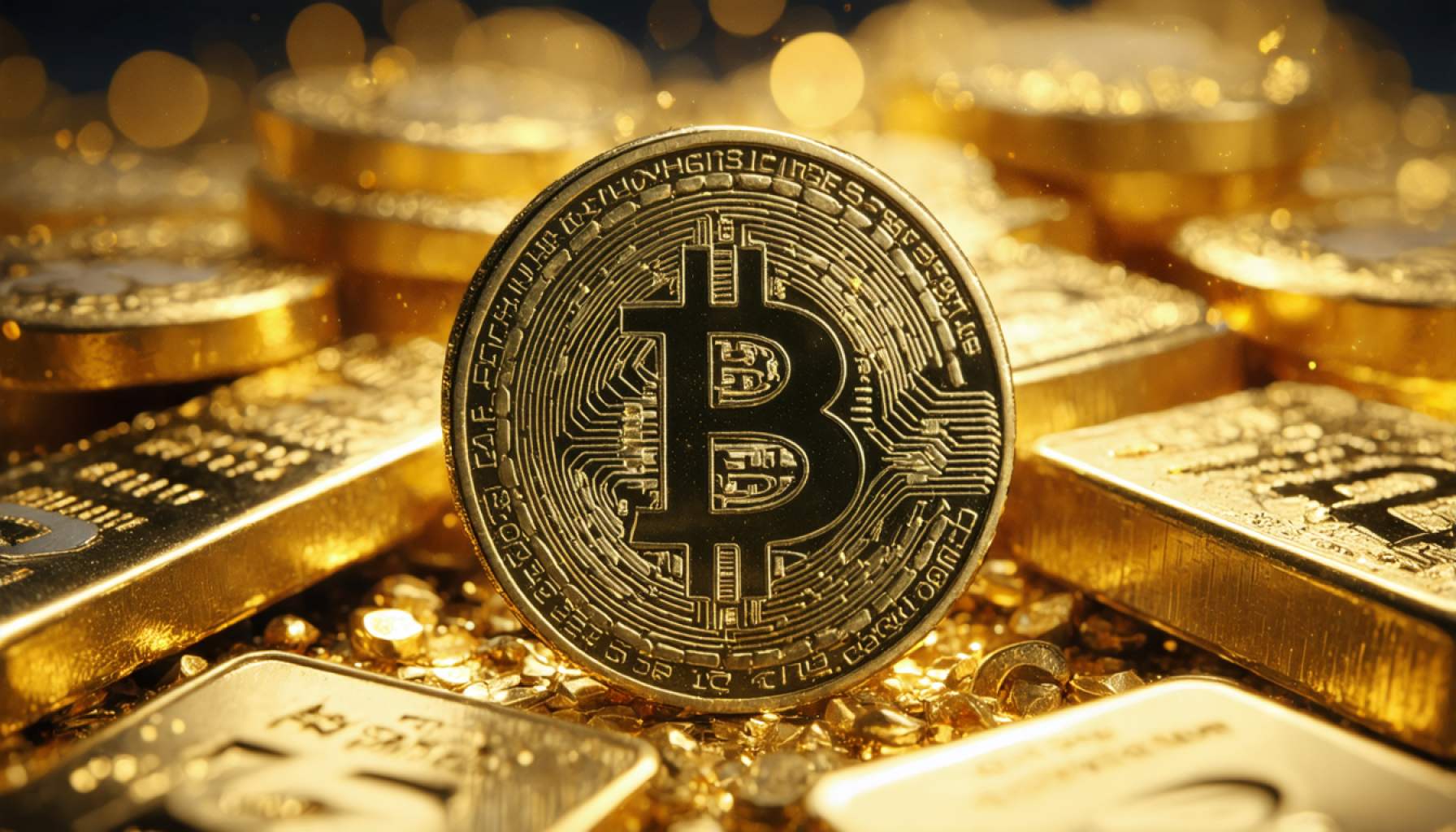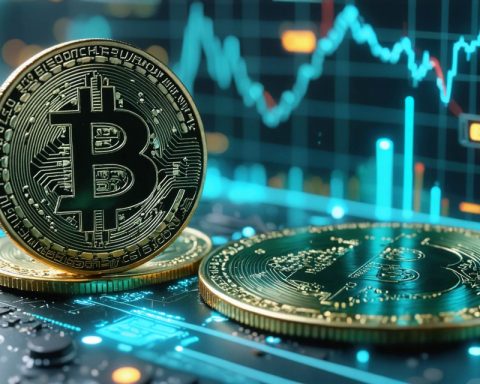- Bitcoin’s status as “digital gold” is under debate due to increased scrutiny and market dynamics.
- Gold’s value has surged past $3,100 per ounce, attracting investors seeking stable, tangible assets.
- Bitcoin, often criticized for volatility, is showing correlation with technology stocks, leading investors to rethink strategies amid economic uncertainty.
- Bitcoin ETFs are experiencing investor outflows, while gold ETFs are seeing continuous inflows.
- Central banks have significantly increased gold reserves, now making up $9 trillion of global financial assets.
- Experts suggest Bitcoin’s “fair value” may be around $71,000, underscoring its inherent volatility and risk.
- The ongoing debate questions whether Bitcoin should maintain its role as a stable investment akin to gold.
As cryptocurrency continues to captivate the world, a vigorous debate unfolds over Bitcoin’s reputation as “digital gold.” Faithful followers of cryptocurrency have long heralded Bitcoin as a shelter against the storm of inflation, the digital sibling to the metallic stalwart, gold. However, with a remarkable surge in the metal’s popularity, this analogy’s validity appears to be waning in the face of new scrutiny.
Visit the bustling exchanges of Wall Street or the tranquil offices of financial analysts, and you’ll find whispers of gold’s triumphant return to the investment spotlight. Throughout this year, its value has soared beyond $3,100 per ounce. This increase reflects a fervent rush among investors toward tangible assets, perceived as more stable, while Bitcoin’s once-bright luster seems to flicker amid the winds of volatility.
Bitcoin, known for its propensity for wild price swings and its newfound correlation with technology stocks, faces criticism. Compared to the dramatic highs it achieved by the end of 2024, this year has seen Bitcoin falter as investors recalibrate their strategies, seeking refuge from economic uncertainty.
A glance at the movement within exchange-traded funds (ETFs) uncovers a telling trend. In recent months, Bitcoin ETFs have watched investors flee from their fold, a stark contrast to the continuous inflow into gold ETFs. Futures also paint a vivid picture of the shifting sands: investors have turned bearish on Bitcoin since mid-January, while their optimism for gold remains undiminished. This shift isn’t confined to private investors alone. Central banks too have ramped up their gold purchases, swelling their reserves to unprecedented levels. Today, nearly $9 trillion, a staggering 3.5% of global financial assets, gleams in gold vaults worldwide—a treasure equally split between the vaults of private investors and the coffers of central banks.
Bitcoin’s evaluation becomes knottier as experts like Nikolaos Panigirtzoglou of JPMorgan provide new insights. Despite Bitcoin trading at approximately $82,000, analysts pinpoint its production costs at $62,000. Historically, this threshold has served as an empirical floor. Yet, calculating the fair valuation, JPMorgan postulates a sum nearer to $71,000, aligning with the risk valuation methods applied against the $5 trillion in private investments in gold. This computation reflects an acknowledgement of Bitcoin’s inherent volatility and risk.
For those entrenched in the financial markets, the real question isn’t merely whether Bitcoin can hold its ground as digital gold, but rather, if it should continue to do so. As the debate rages on, one thing is certain: in the dynamic world of investments where choices are vast and varied, gold salutes stability, while Bitcoin dares you to dream of the future.
Is Bitcoin Truly the “Digital Gold” or Just Another Volatile Asset?
Understanding the Bitcoin and Gold Analogy
Bitcoin has often been referred to as “digital gold,” a moniker that underscores its perceived potential to act as a hedge against inflation, much like physical gold. However, discrepancies in price stability, market behavior, and regulatory challenges challenge this comparison. To explore the validity of the Bitcoin-gold analogy further, let’s delve into additional perspectives and data that were not fully elaborated in the source article.
Key Differences Between Bitcoin and Gold
1. Volatility and Market Behavior:
– Gold is renowned for its stability and low volatility, commonly used as a hedge against economic downturns. In contrast, Bitcoin is highly volatile, with its price influenced by market sentiment, regulatory news, and technological developments.
2. Intrinsic Value:
– Gold’s intrinsic value is underpinned by its physical properties and historical currency use, while Bitcoin’s value is derived from its network effect and limited supply dictated by its underlying blockchain protocol.
3. Regulation and Legality:
– Gold markets are heavily regulated with a mature global infrastructure. Bitcoin, however, faces uncertain regulatory landscapes, causing concerns about its long-term viability as a safe haven asset.
Market Trends and Forecasts
– Gold Market:
– Recent trends indicate a surge in gold investments, bolstered by increasing demand from central banks and private investors. As geopolitical tensions and economic instability rise, gold maintains its allure due to its long-term track record (source: World Gold Council).
– Bitcoin Market:
– Despite setbacks, the cryptocurrency market is anticipated to grow as technology matures and adoption increases. However, Bitcoin’s future remains uncertain due to regulatory challenges and competition from other cryptocurrencies like Ethereum, which offer more functional use cases (source: CoinDesk).
Real-World Use Cases
– Gold: Used in jewelry, technology, and as a monetary reserve. Its tangibility and historical significance contribute to its perpetual demand.
– Bitcoin: Primarily used as a speculative investment. It also facilitates peer-to-peer transactions and can bypass traditional financial systems, offering advantages in regions with unstable currencies.
Security and Sustainability
– Environmental Concerns:
– Gold mining impacts ecosystems, but advancements in mining technology aim to mitigate harm. Bitcoin mining, conversely, raises environmental concerns due to high electricity consumption, mainly when reliant on non-renewable energy sources (source: Cambridge Bitcoin Electricity Consumption Index).
Pros and Cons Overview
Bitcoin:
– Pros: Potential for high returns, decentralized, and borderless transactions.
– Cons: High volatility, regulatory risk, environmental impact.
Gold:
– Pros: Stability, intrinsic value, universally recognized.
– Cons: Limited upside potential compared to nascent technologies, physical storage requirements.
Actionable Recommendations for Investors
1. Diversification:
– Combine both gold and Bitcoin in your investment portfolio to balance risk and potential rewards.
2. Stay Informed:
– Continuously monitor financial news and expert analysis. Being aware of market trends and regulatory changes can help make informed investment decisions.
3. Risk Assessment:
– Evaluate your risk tolerance and time horizon. If you seek stability, gold may be preferable. For higher risk and potential return, consider adding Bitcoin.
In summary, whether Bitcoin deserves the title of “digital gold” is still up for debate. Both assets have unique roles in hedging against economic uncertainties, and the decision to invest should be guided by individual preferences, risk tolerance, and market insights. For more on investment strategies and market trends, visit Investopedia.










